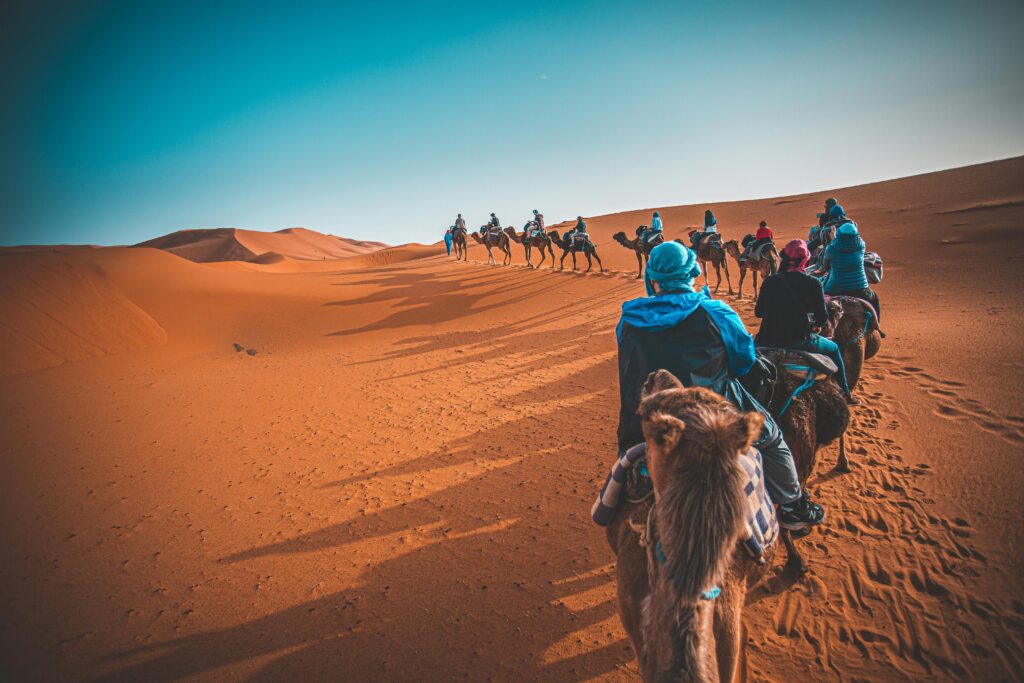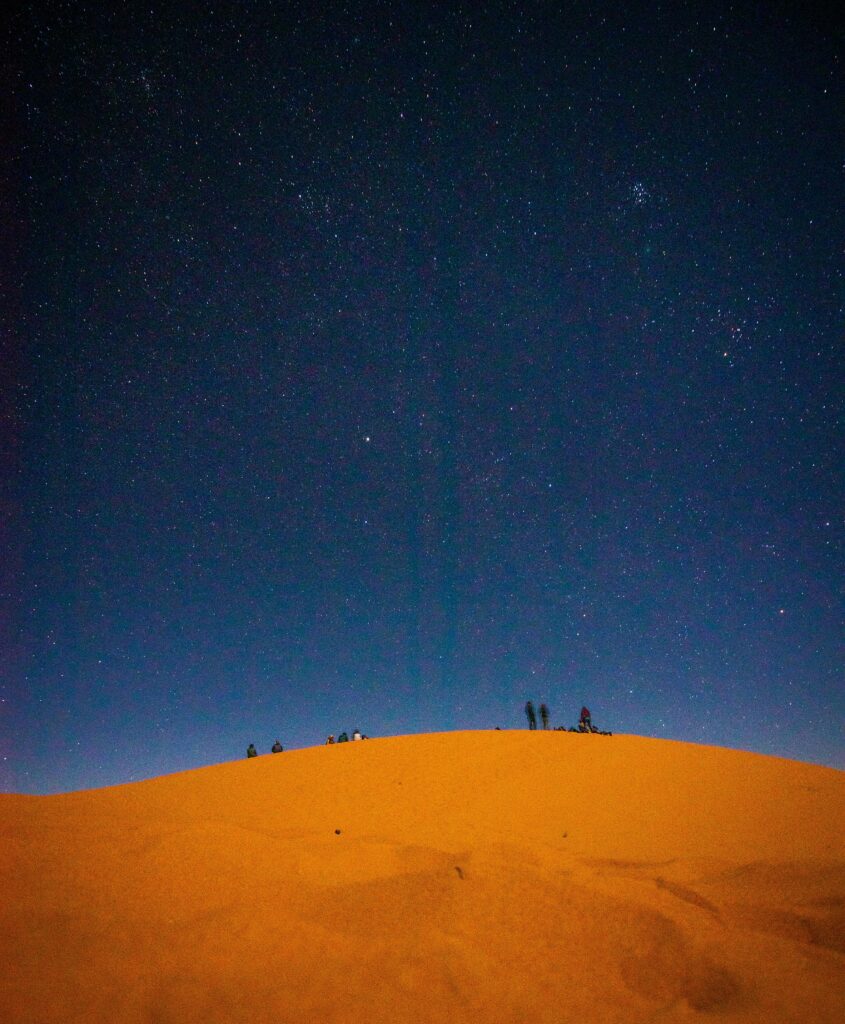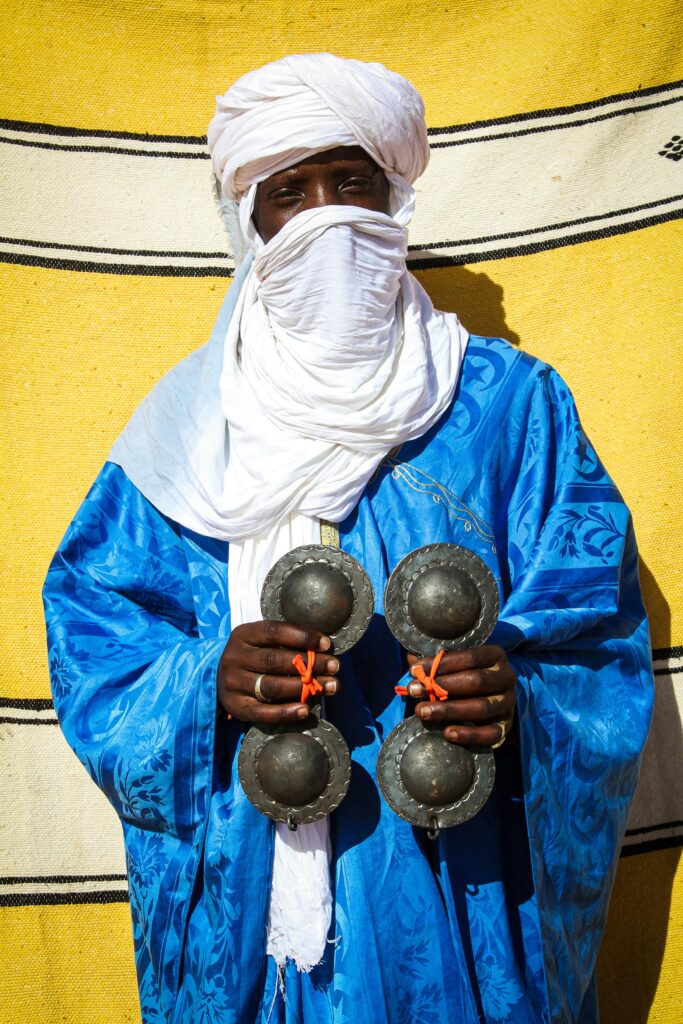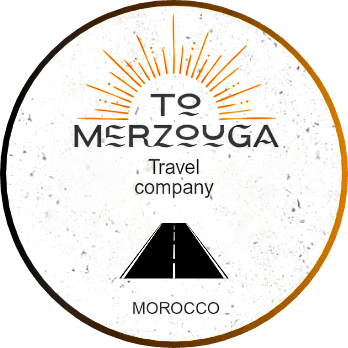
There are places on this earth that blow your mind in the best way —places that remind you of how big, quiet, and beautiful the world can sometimes be. One live example of such places is the famous Sahara Desert of Merzouga, a golden sea of dunes located in the southeastern part of Morocco a few miles away from the borders between Morocco and Alegeria. Fun fact, Merzouga is more than just a destination, Merzouga is an unforgettable experience of a lifetime that lives on with you, regardless of who you are and where you are from.
In this blog post, we will take you deep into the heart of such a beautiful desert town of Merzouga—its dunes, people, traditions, and the like. Whether you’re a solo traveler, a couple seeking romance, or an adventurer looking for mysteries and adventures, Merzouga has always got something to offer you.
Where Is Merzouga?
I did mention the location of Merzouga earlier, but in a brief manner, therefore I would like to elaborate more and provide as much information as I can. First off, Merzouga is a small desert village situated near the Algerian border. Merzouga is approximately 560 kilometers from Marrakech and 460 kilometers from Fez. It is sits next to the giant Erg Chebbi dunes, an endless sea of sand that stretches for over 30 kilometers and reaches up to 150 meters in some places.
Despite its relatively remote location, Merzouga has become one of Morocco’s top desert destinations, thanks to its surreal landscapes and the warm hospitality of its people.
The magic of Erg Chebbi
The term “erg” refers to a large sea of wind-swept sand. Erg Chebbi is one of Morocco’s two major desert ergs (the other one is Erg Chigaga near M’Hamid). These aren’t just ordinary sand dunes—they are masterpieces born out of nature and shaped by time and desert wind, glowing in colors that shift from gold to orange to deep red as the day passes.
Walking among those dunes, one feels as though they have entered another world of beauty and endless calmness. The silence is profound.
Top Things to Do in Merzouga
1. Camel Trekking at Sunset or Sunrise
When one thinks of desert & Sahara, the first that surely will cross one’s mind is ” Sand” , “Nomads in traditional outfits” and ” A caravan of camels”. This is perhaps the most iconic picture of Merzouga, and it feels so real one you decide to experience that. In fact, Climbing onto a camel and riding into the dunes as the desert sun paints them in gold and orange is a timeless experience. Whether you go for a short trek or a multi-day caravan, you’ll quickly understand why this remains one of the most magical ways in which you can get in touch with the Sahara.

2. Overnight stay in a Desert Camp
Spending a night in the desert is something that is a completely different vibe. Many travelers prefer to stay in traditional Berber-style tents, with local Moroccan food, music, and the unforgettable serenity of the desert night. You sit around a campfire, share stories with fellow travelers, and watch the stars in some of the clearest skies on Earth.

3. 4×4 Excursions Around the Sahara Desert of merzouga
For those wanting to see more of the region and save time , a 4×4 tour can take you beyond the Saharan dunes & let you experience a unique desert trip. Once you opt for a 4×4 tour, expect the following activities and stops along the way.
- Nomadic family homes where visitors can learn about desert lifestyles from actual nomads.
- The Mifis mines, they were once used for lead and salt extraction
- Desert plateaus and fossil fields
- Hidden oases surrounded by date palms
These tours reveal the Sahara’s diversity—its geological wonders, its hidden life, and the people who call it home.
4. Sandboarding
Who says deserts can’t be fun? You can just Grab sandboard, hike up a tall dune, and do sandboarding all the way down ! Sandboarding is a favorite among adventurous travelers and surprisingly easy to try—even for beginners.
5. Visit Dayet Srij (Serji) Lake
Just outside Merzouga, there is a seasonal lake that shows up after heavy rains and becomes a heaven for birdlife. If the timing is right, you might be able to see flamingos, herons, and ducks lounging peacefully with dunes rising behind them. The contrast of water and desert is truly fascinating.
Cultural Encounters in Merzouga desert:
Merzouga isn’t just about landscape—it’s also about people. The village and its surroundings are home to Amazigh (Berber) families, as well as descendants of Sub-Saharan Africans who have shaped a unique cultural identity over generations.
Gnawa Music in Khamlia
Khamlia, a nearby village, is known for its Gnawa music, a spiritual and rhythmic tradition brought from Mali and Sudan. Visiting a local music house here is a powerful cultural exchange—you’ll hear soothing rhythms played on krakebs (metal castanets) and feel the deep emotion in every chant.

Traditional Food and Tea
No visit is complete without trying local desert food such as:
- Berber pizza (medfouna), a round, stuffed bread cooked over hot coals
- Lamb or vegetable tagine cooked slowly in clay pots
- Couscous with seasonal vegetables All accompanied, of course, by a glass of fresh mint tea, often called “Berber whisky”—a symbol of hospitality and tradition.
Best Time to Visit Merzouga
The desert is beautiful all year-round, but timing your visit can make a big difference in comfort.
- Spring (March–May): Warm days, cooler nights—one of the best times to go
- Autumn (September–November): Similar to spring, with mild temperatures
- Winter (December–February): Cold at night but often sunny by day; great for photography and peaceful treks
- Summer (June–August): Very hot during the day, with temperatures over 45°C (113°F); not ideal unless you’re used to extreme heat
Desert mornings and nights can be surprisingly cold, even in summer, so be ready for all the possible changes in temperature.
What to Pack for the Desert
What to Pack for the Desert
Whether you’re trekking by camel or staying in a camp, here are a few basic things:
- Light, long-sleeved clothing (to protect from sun and sand)
- A scarf (to cover your face when the wind starts to blow)
- Sunscreen and sunglasses
- A flashlight
- A camera or phone with lots of storage—you’ll be taking many photos
- Comfortable shoes for walking on sand
- Warm clothing for night (temperatures can drop to below zero)
Getting to Merzouga desert
Despite its remote location, Merzouga is accessible from almost every city in Morocco.
- By Car: From Marrakech or Fez, the drive usually takes 8–10 hours. You 2ill passes through the high Atlas Mountains, kasbahs, valleys, and palm groves—making the journey even more interesting.
- By Bus: There is daily buses from cities like Fez, Rissani, and Errachidia connect to Merzouga via companies like Supratours ( There is a website where you can buy tickets).
- By Plane: The nearest airport is in Errachidia, about 2 hours away. From there, you can take a private taxi or bus.
Travel Tips
- Culture: Dress modestly, ask before taking photos of people, and try to learn a few basic words in Arabic or Tamazight.
- Buy local: Whether it’s crafts, music, or food, supporting local artisans helps preserve desert culture, but you should negotiate the price sometimes.
- Leave no trace: The dunes are beautiful—let’s keep them that way. Don’t litter, and avoid damaging the environment.
- Go with the flow: Desert life follows a slower rhythm. Embrace the pace, and make the most of your visit.
Last but not least, there’s something spiritual and fascinating about the Sahara desert. Maybe it’s the way the sand reshapes itself each day, or how time seems to stand still. Maybe it’s the softness of it and its light of sunrise, or the deep conversations that happen when phones are out of range and stars are overhead.
In Merzouga, you feel close to nature, to tradition, and to yourself.
This is not a place you just visit—it’s also a place that you connect with and that stays with you, long after the journey ends. Whether it’s your first time in Morocco or your tenth, the desert of Merzouga offers a deep, unforgettable connection to the land, the people, and the ancient spirit of the Sahara. Discover some reels were shot in merzouga desert on our instagram

[…] not forget to check our tour itineraries & our blogs for more information about Morocco and the Sahara Desert of Merzouga. and for further details please contact our Team on […]